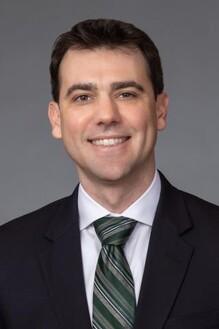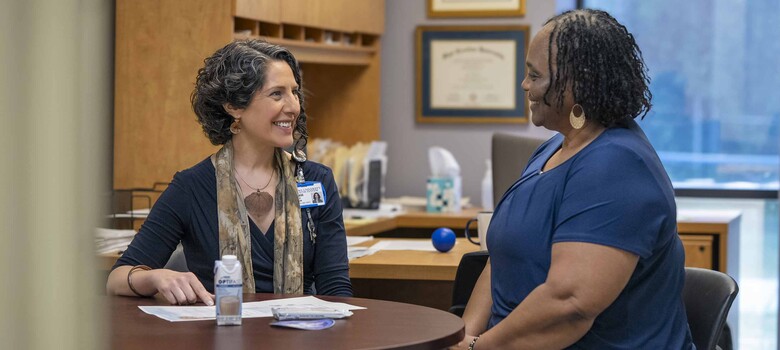Beating Metastatic Cancer After Treatment at Duke

Chris Biggar stands outside his home in Durham, NC.
Chris Biggar was only 34 years old when he was diagnosed with a rare kind of metastatic colon cancer two years ago. After several surgeries and immunotherapy at Duke Cancer Center, his scans are clear. Now he’s proud to be involved in advocacy work, raising awareness and dollars to fund colorectal cancer research.
Sudden Pain and a Difficult Diagnosis
Chris Biggar was sitting on the couch in Durham, in early September 2022, when he “stood up and it felt like somebody stabbed me in my stomach. I dropped to my knees and was yelping in pain,” he said.
Urgent care sent him to the emergency room at Duke University Hospital, where a CT scan revealed that Biggar had multiple lesions in his liver and his colon. “I was like, ‘oh man, it’s probably liver disease,” said Biggar. “It was full-blown metastatic colorectal cancer, stage four.”
Rare Type of Cancer Points to Immunotherapy
"Chris has a rare subtype of colon cancer that makes it respond better to immunotherapy, unlike most colon cancers which are treated with chemotherapy,” explained Biggar’s doctor, Duke medical oncologist Nicholas C. DeVito, MD.
“The first step is always the most important in oncology,” continued Dr. DeVito. “And here, we get the first step. We really do. The thing that Duke did right with Chris, and that we do right with a lot of people, is getting that initial treatment plan really, really lined up and making sure that everyone knows what everyone else is thinking -- including the patient.”
“I didn’t know what immunotherapy meant, but I know what chemo is, and I didn’t want to do that,” said Biggar. “I was ready and willing to trust Dr. DeVito, and I’m very glad I did.” Biggar began immunotherapy shortly after his diagnosis.
A Challenging Autumn
The next months were difficult. He was admitted to the hospital multiple times, for a pulmonary embolism, for blood clots in his legs, for an infection, and for a bowel obstruction that required colorectal surgeon Christopher Mantyh, MD, to remove one-third of his colon and perform a surgical procedure called an ileostomy that creates an opening in the abdominal wall through which the small intestine can expel waste products.
After that, Biggar’s health started declining dramatically. “From November until about mid-January, I was at my sickest,” he said. “I was losing weight. I couldn't eat. Things were not looking great. But in January I started feeling better. I felt like we were winning.”
Wizardry at Duke Health
In July 2023, Biggar underwent three surgeries. First, Duke surgical oncologist Michael Lidsky, MD, removed a tumor in his liver. “All they found was basically a calcified husk of a tumor, full of dead cancer,” said Biggar.
Next, Dr. Mantyh reattached his colon and reversed his ileostomy. “Taking a third of your colon out really does not alter the way you eat or your bowel function in general. It's extraordinarily well tolerated,” explained Dr. Mantyh. Finally, plastic surgeon Detlev Erdmann, MD, PhD, MHSc, reconstructed Biggar’s abdominal wall.
“Dr. Mantyh is a wizard,” said Biggar. “It's insane how great my surgical and medical teams are, the art that they perform.”
Biggar finished immunotherapy in June of 2024. “My scans were totally clear,” he said. Based on his scans and his bloodwork, Dr. DeVito said that there is more than a 98% chance that he will not have a recurrence.
Dr. Mantyh credits Chris’s recovery to the expertise found at Duke and to developments in cancer treatment. “Dr. DeVito is one of the nation’s or maybe the world's foremost experts in immunotherapy as far as treatment goes,” he said. “This is something that we weren't doing 10 years ago, or even five years ago. I think Chris has an excellent prognosis going forward.”
Crushing Colorectal Cancer
Today, Biggar is an active advocate for colorectal cancer awareness and research. “I reach out to as many people, businesses, and organizations as I can,” he said. Due to his advocacy, the mayor of Durham declared March to be Colorectal Cancer Month. There was also a Crush Colorectal Cancer 5K, where Biggar was on a team with Dr. DeVito and his family.
“I do it all for the other patients and future patients,” said Biggar. “Everybody deserves the kind of care I got at Duke.”






